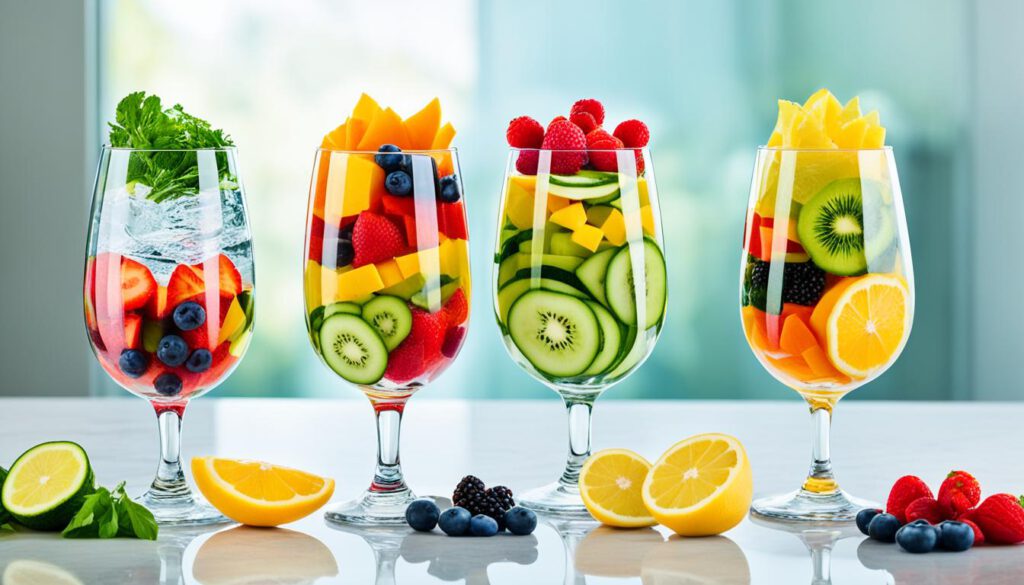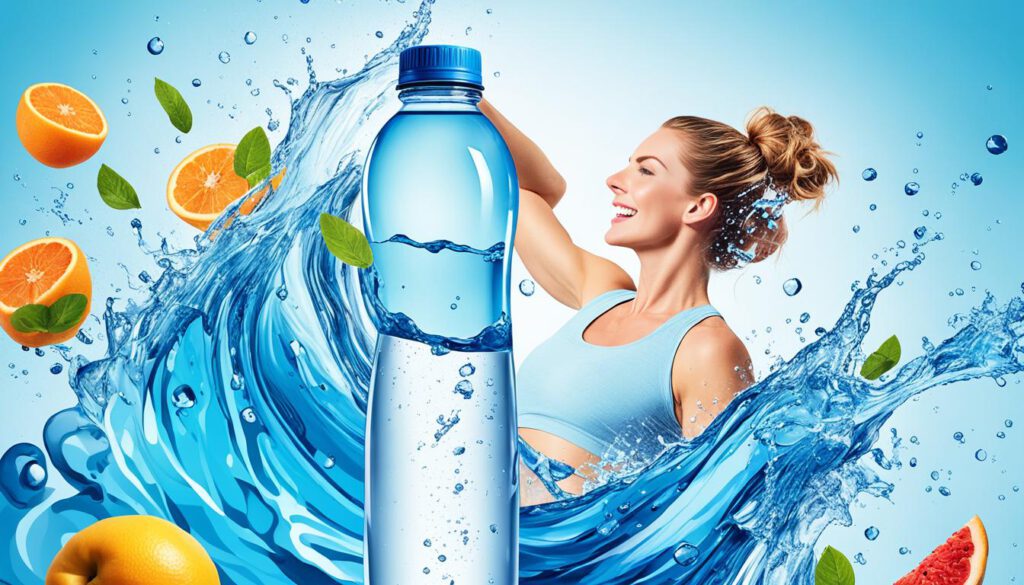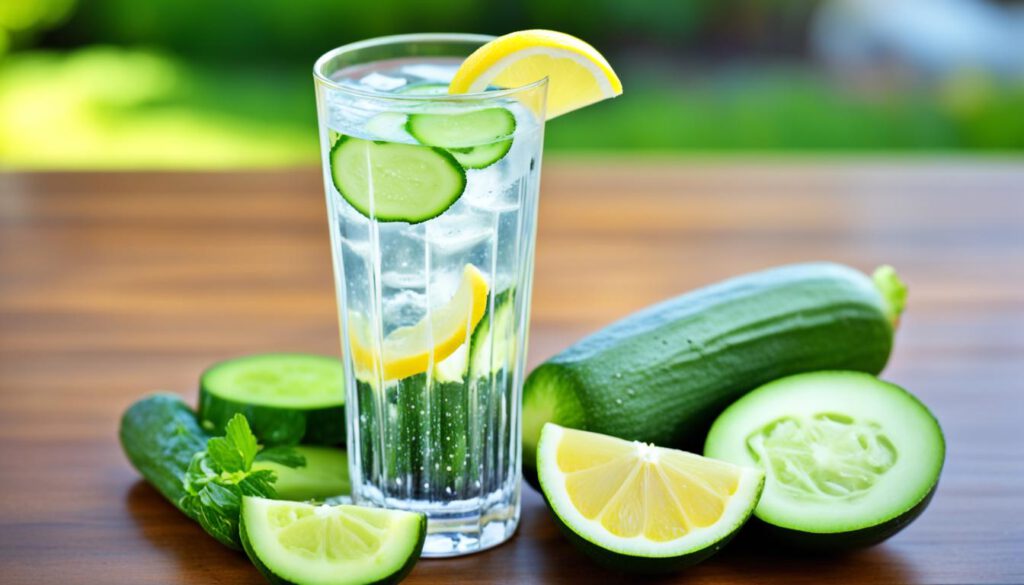When it comes to weight loss, hydration plays a crucial role. Incorporating water into your daily routine can help suppress your appetite, support digestion, and boost your metabolism. Here are 5 effective ways to drink water for weight loss:
1. Drink water before and after meals: Consuming a glass of water before and after meals can help you feel full and satisfied, reducing your calorie intake. It also aids in digestion.
2. Choose water over sugary drinks: Opt for water instead of high-calorie beverages like soda or juice. Not only does this save you calories, but it also keeps you hydrated without adding unnecessary sugars.
3. Try a water detox: Infuse your water with fruits and vegetables to add flavor and beneficial nutrients. This refreshing alternative to sugary drinks can keep you hydrated while promoting weight loss.
4. Drink water throughout the day: Instead of reaching for calorie-dense drinks, make water your go-to beverage. It has zero calories and can help you feel full, leading to reduced calorie intake.
5. Cut down on salt and increase water intake: High sodium intake can cause the body to retain water and contribute to bloating. By reducing salt intake and increasing water consumption, you can flush out excess water weight.
Key Takeaways:
- Drinking water before and after meals can help suppress your appetite and aid digestion.
- Choosing water over sugary drinks can contribute to weight loss and hydration.
- Infusing water with fruits and vegetables can add flavor and health benefits.
- Drinking water throughout the day can reduce calorie intake and promote weight loss.
- Reducing salt intake and increasing water consumption can help flush out excess water weight.
Drink Water Throughout the Day to Cut Calories
One of the best ways to increase water consumption and support weight loss is to drink water throughout the day. By opting for water instead of calorie-dense drinks, you can effectively cut calories and reduce your overall energy intake.
Water is an excellent choice for hydration because it has zero calories. When you drink water before or during meals, it can make you feel full and satisfied, leading to decreased calorie consumption. This can be especially helpful if you’re trying to manage your weight or shed a few pounds.
If you miss the taste of sugary beverages, you can try flavored water as a healthier alternative. Adding a hint of flavor to your water can make it more enjoyable to drink while still keeping it calorie-free.
To ensure you stay hydrated and maximize your water intake, it can be helpful to set reminders throughout the day. Whether it’s an alarm on your phone or a sticky note on your desk, these reminders will prompt you to drink water regularly. Additionally, keep a water bottle nearby so that it’s easily accessible and visible, serving as a constant reminder to drink more water.
The recommended daily water intake varies depending on factors such as your sex, age, and activity level. As a general guideline, women should aim for about 12 cups (2.7 liters) of water per day, while men should aim for about 16 cups (3.7 liters) of water per day. This amount includes all fluids consumed, including water from foods and other beverages.
Benefits of Drinking Water:
- Zero calories, making it a great option for weight loss
- Helps you feel full, reducing calorie intake
- Aids in digestion and metabolism
- Keeps you hydrated and supports overall health
Water Intake Recommendations
| Group | Recommended Daily Water Intake |
|---|---|
| Women | 12 cups (2.7 liters) |
| Men | 16 cups (3.7 liters) |
Have a Glass of Water Before Each Meal
One effective way to manage your weight and improve your overall health is by having a glass of water before each meal. This simple practice can have significant benefits and help you achieve your weight loss goals.
Drinking water before meals has several advantages. First and foremost, it can help suppress your hunger, making you feel fuller and reducing the chances of overeating. When you drink water before a meal, it fills up your stomach, creating a sensation of satiety. This can prevent you from consuming excess calories and aid in weight management.
Moreover, water plays a vital role in digestion. It helps break down the food you eat and facilitates the absorption of essential nutrients by your body. By improving the efficiency of your digestive system, water can enhance nutrient absorption and optimize your overall nutritional intake.
A glass of water before each meal can also serve as a reminder to eat mindfully. It gives you a moment to pause and reflect on your hunger levels, allowing you to make more conscious choices about the portion sizes and food selections.
It’s important to note that while having water before meals can offer benefits for weight management, it is not a standalone solution. A balanced and healthy diet, rich in fiber, protein, and other essential nutrients, is crucial for sustainable weight loss. However, incorporating a glass of water into your routine can complement these efforts and support your overall wellness.
“Drinking water before each meal can help suppress hunger and reduce calorie intake.”
To keep track of your water intake and ensure you’re meeting your hydration goals, consider using a water bottle with measurements or a hydration tracking app. This can help you stay accountable and make sure you’re consuming an adequate amount of water throughout the day.
Remember, staying hydrated is not only important for weight management but for overall health and well-being. Water plays a vital role in various bodily functions, including regulating body temperature, lubricating joints, and supporting organ function.
By making a habit of having a glass of water before each meal, you can support your weight loss efforts, promote healthy digestion, and optimize your overall hydration.
| Benefits of Having Water Before Each Meal |
|---|
| Suppresses hunger and reduces calorie intake |
| Aids in digestion and nutrient absorption |
| Promotes mindful eating and portion control |
| Supports overall hydration and bodily functions |
Cut Salt Intake and Drink More Water
Reducing salt intake and increasing water consumption are effective strategies for weight control and staying hydrated. Salt causes the body to retain water, resulting in bloating and water weight gain. By cutting back on salt and choosing low-sodium alternatives, you can reduce water retention and promote weight loss.
To further support your weight goals, prioritize drinking an adequate amount of water throughout the day. Water has zero calories and can help boost metabolism. It also helps flush out toxins and supports digestion.
Avoiding fast food and processed snacks can significantly reduce your sodium intake. Instead, opt for fresh and whole foods that are naturally low in sodium. By incorporating herbs and spices into your meals, you can enhance flavor without relying on salt.
Here is a table illustrating the sodium content of common condiments and their low-sodium alternatives:
| Condiment | Sodium Content (per serving) | Low-Sodium Alternative |
|---|---|---|
| Ketchup | 160mg | Low-sodium ketchup (35mg) |
| Soy Sauce | 920mg | Reduced-sodium soy sauce (600mg) |
| Salad Dressing | 300-500mg | Vinegar and olive oil dressing (10-20mg) |
Remember, staying hydrated is crucial for weight loss and overall well-being. Make it a habit to drink water throughout the day and aim for at least 8 cups of water daily.
**Caption**: Drinking water is essential for weight control and staying hydrated.
Consume Water-Rich Foods for Hydration and Weight Loss
Eating water-rich foods can have multiple benefits for your overall health and weight management goals. These foods not only help keep you hydrated but also provide essential nutrients while being low in calories. Incorporating them into your diet can support healthy drinking habits and contribute to effective weight loss.
Hydrate and Feel Fuller with Water-Rich Fruits and Vegetables
Choosing fruits and vegetables with high water content can keep you refreshed and satisfied. Some examples of water-rich foods include:
| Fruits | Vegetables |
|---|---|
| Watermelon | Cucumber |
| Strawberries | Lettuce |
| Grapes | Celery |
| Oranges | Tomatoes |
| Pineapple | Broccoli |
These water-rich foods can help keep you hydrated throughout the day and provide essential vitamins and minerals. They can also aid in digestion and contribute to a feeling of fullness, preventing overeating.
Eating water-rich foods can be a delicious and nutritious way to stay hydrated and support your weight loss journey. Remember to incorporate a variety of fruits and vegetables into your meals for optimal health benefits.
Plan a Water Detox for Short-Term Weight Loss
Water detoxing is a popular method for achieving short-term weight loss. It involves following a lower-calorie diet and consuming primarily infused water for a specific period of time. Water detoxing can provide several benefits, but it is important to approach it cautiously and seek medical advice before starting.
During a water detox, the focus is on replacing high-calorie and sugary beverages with water. Infused water, which is water infused with fruits, vegetables, or herbs, can add flavor and enhance the detox experience. This refreshing and hydrating beverage can help you stay satisfied while reducing calorie intake. Incorporating a variety of fruits and vegetables in your infused water can provide additional nutrients and antioxidants that support overall health.
While a water detox can aid in short-term weight loss, it is not a long-term solution. It is important to remember that sustainable weight loss requires a balanced and nutritious diet, regular exercise, and lifestyle changes. Consult with a healthcare professional before attempting a water detox to ensure it is appropriate for your specific situation.
During a water detox, it is crucial to listen to your body and pay attention to any symptoms of sickness or discomfort. If you experience any adverse effects, such as severe hunger, dizziness, or weakness, it is recommended to discontinue the detox and seek medical advice.
To give you an idea of what a water detox plan might look like, here’s an example:
| Day | Meals | Infused Water |
|---|---|---|
| Day 1 | Low-calorie breakfast, lunch, and dinner | Strawberry, lemon, and basil infused water |
| Day 2 | Low-calorie breakfast, lunch, and dinner | Cucumber, mint, and lime infused water |
| Day 3 | Low-calorie breakfast, lunch, and dinner | Watermelon, basil, and lemon infused water |
The example above provides a general outline, but it’s important to customize the plan to fit your individual needs and preferences. Remember to stay hydrated throughout the detox by drinking at least 8 cups of water per day.
Overall, a water detox can be a refreshing and beneficial way to kickstart your weight loss journey. However, it should be approached with caution and used as a short-term tool rather than a long-term solution. Combine it with a balanced diet, regular exercise, and lifestyle changes for sustainable weight loss and overall health improvement.
Cut Up Veggies and Fruits for Infused Water
Infusing water with fruits and vegetables can enhance the taste and make it more enjoyable to drink during a water detox. By adding flavorful ingredients like strawberry, lemon, and basil, or watermelon, mint, and lime, you can create delicious infused water options.
Not only does infused water provide hydration, but it also adds essential nutrients and antioxidants to your diet. Plus, it’s a great way to curb cravings for sugary beverages during a water detox.
For a refreshing twist, try cutting up the veggies and fruits into small pieces and placing them in a pitcher or water bottle. Let the flavors infuse for a couple of hours or overnight for stronger taste. The result is a hydrating and tasty drink that aids in weight loss.
Remember, during a water detox, it’s important to consume a minimum of 12 cups of water per day for women and 16 cups for men to stay properly hydrated. This daily water intake, combined with infused water and water-rich foods, can contribute to effective hydration and weight loss.

| Fruits | Vegetables | Herbs and Spices | Options |
|---|---|---|---|
| Strawberries | Cucumber | Basil | Strawberry, Cucumber, and Basil |
| Watermelon | Mint | Lime | Watermelon, Mint, and Lime |
| Lemon | Lemon | Rosemary | Lemon and Rosemary |
“Infused water adds flavor and nutrients to your hydration routine, making it easier to stay on track during a water detox.” – Nutritionist Sarah Thompson
By incorporating cut-up fruits and vegetables into your water intake, you can reap the benefits of hydration and weight loss while enjoying flavorful and satisfying drinks.
Aim for a Maximum of 8-Day Water Fast
Water fasting is a practice that involves consuming only water for a specific period of time. While it may be tempting to embark on an extended water fast for rapid weight loss, it is important to exercise caution and prioritize your health. Ideally, a water fast should not exceed 8 days and should be supervised by a healthcare professional to ensure your safety.
Water fasting can result in various effects on your body, including:
- Fatigue
- Dizziness
- Muscle loss
- Dehydration
If you decide to pursue a water fast, it is crucial to monitor your body closely and listen to any signals of discomfort or distress. Maintaining hydration throughout the fast is essential to prevent dehydration. However, it is important to note that water fasting should not be viewed as a long-term solution for weight loss.
If a prolonged water fast is not suitable for you, there is an alternative that you can consider:
Intermittent Fasting
Intermittent fasting involves alternating periods of fasting and eating. One popular approach is to replace one or two meals with water and consume a low-calorie meal during the eating window. This method can provide many of the benefits associated with water fasting while being more sustainable for long-term weight management.
Remember:
Water fasting should always be approached with caution and under the guidance of a healthcare professional. It is important to prioritize your health and well-being above any desire for quick weight loss results.
Now that you are aware of the potential risks and considerations associated with water fasting, it’s time to explore other ways you can incorporate water into your weight loss journey.
| Factors | Water Fasting | Intermittent Fasting |
|---|---|---|
| Duration | Up to 8 days | Varies (e.g., 16:8, 18:6, 24-hour fasts) |
| Eating Pattern | No solid food allowed | Designated eating and fasting periods |
| Potential Benefits | Rapid initial weight loss, autophagy, mental clarity | Weight loss, improved insulin sensitivity, convenience |
| Risks | Fatigue, dizziness, muscle loss, dehydration | Potential overeating during eating periods, nutrient deficiencies if not properly balanced |
| Long-Term Sustainability | Not recommended for long-term use | Can be sustained as a lifestyle with appropriate modifications |
Eat Lightly Before Starting a Water Fast
Before attempting a water fast, it is important to gradually reduce calorie intake and prepare the body for decreased calories. This can be done by switching to lighter meals and smaller portions. By making these dietary changes, you can help ease the transition into a water fast and minimize any potential discomfort.
Listening to your body is crucial during this process. If you feel extremely hungry or tired, it is essential to pay attention to your body’s signals and not push yourself too hard. Water fasting should always be done under the guidance and supervision of a qualified healthcare professional.
Consulting with a doctor before starting a water fast can provide valuable insights into your specific caloric needs and health considerations. They can offer personalized advice and recommendations based on your individual circumstances.

Incorporating these essential steps into your water fasting journey can help ensure a smoother experience and maximize the potential benefits of water fasting.
Start Your Water Fast with Pure Water
When embarking on a water fast, the consumption of pure water is crucial. During this period, it is important to refrain from consuming anything other than plain water. This means avoiding juices, coffee, tea, and any other beverages or foods. Pure water allows your body to enter a state of fasting, where it can focus on detoxification, healing, and weight loss.
During a water fast, it is normal to experience feelings of hunger, especially in the initial stages. When hunger strikes, rather than reaching for food, drink water instead. Water can help alleviate hunger pangs and keep you feeling satiated. If you find yourself feeling weak, dizzy, or fatigued, it may be beneficial to take a small snack to replenish your energy levels. Opt for light, easily digestible options such as a piece of fruit or a handful of nuts.
It’s important to note that exercising during a water fast should be avoided. Your body may not have enough energy reserves to support physical exertion. Resting and allowing your body to conserve energy will facilitate the fasting process and ensure optimal results.
| Pros of Starting with Pure Water | Cons of Starting with Pure Water |
|---|---|
|
|
Tips for Increasing Water Intake throughout the Day
When it comes to healthy drinking habits and weight loss, increasing your water intake is essential. Here are some tips to help you incorporate more water into your daily routine:
- Establish a water-drinking routine: Set specific times throughout the day to drink water, such as when you wake up, before meals, and before bedtime. This will help you develop a consistent habit and ensure you stay hydrated.
- Carry a reusable water bottle: Having a water bottle with you wherever you go makes it easier to drink water throughout the day. Choose a bottle that is convenient to carry and refill, and make it a habit to take sips regularly.
- Add flavor to your water: If plain water feels boring to you, try adding flavor with slices of fruit, such as lemon or cucumber, or a sprig of herbs like mint or basil. This can make your water more enjoyable to drink and encourage you to drink more of it.
- Drink decaf tea or dairy products: Herbal teas and decaf varieties can contribute to your overall hydration while adding variety to your beverage choices. Similarly, consuming dairy products like milk or yogurt can also provide hydration and be a healthy alternative to sugary drinks.
- Choose water-rich foods: In addition to drinking water, incorporating water-rich foods into your meals can also increase your overall water consumption. Include soups, salads, and fruits and vegetables with high water content, such as watermelon and cucumbers, in your diet.
By following these tips, you can develop healthy drinking habits and ensure you’re consuming enough water for weight loss and overall well-being.
Conclusion
Drinking water is an essential component of weight loss tips and staying hydrated for weight loss. It offers several benefits, including suppressing your appetite, reducing calorie intake, aiding digestion, increasing metabolism, and promoting overall hydration. However, it is important to note that water alone is not a magic solution for weight loss.
To achieve optimal results, it is crucial to combine drinking water with a healthy diet and regular exercise. Incorporating these tips into your daily routine can help you stay hydrated and support your weight loss goals. Remember to drink water before and after meals, choose water over sugary drinks, and opt for a water detox to boost your metabolism. Additionally, reducing salt intake, consuming water-rich foods, and planning a water fast cautiously can all contribute to effective weight management.
By following these weight loss tips and staying hydrated, you can pave the way for a healthier lifestyle and achieve your desired weight loss goals.
FAQ
What are some ways to drink water for weight loss?
Here are five tips for drinking water to aid in weight loss:
How can drinking water throughout the day help with weight loss?
Drinking water instead of calorie-dense drinks can help reduce calorie intake. Additionally, water has zero calories and can make you feel full, leading to decreased consumption during meals. It can also help boost metabolism.
Why should I have a glass of water before each meal?
Having a glass of water before meals can help suppress hunger, reduce calorie intake, and aid digestion. It can also help fill your stomach, making it less tempting to overeat.
How does cutting salt intake and drinking more water contribute to weight loss?
Salt can cause the body to retain water, leading to water weight. By cutting salt intake and increasing water consumption, you can help flush out excess water weight and support weight loss.
How can water-rich foods help with hydration and weight loss?
Foods with high water content, such as fruits and vegetables, can help you stay hydrated and feel fuller for longer. They are also low in calories, making them a healthy choice for weight loss.
What is a water detox, and how can it aid in weight loss?
A water detox involves following a lower-calorie diet and consuming mostly infused water for a specific period. While it may aid in short-term weight loss, it is important to consult with a doctor before starting and not exceed 72 hours.
How can I make infused water for a water detox?
Infusing water with fruits and vegetables can enhance the taste and make it more enjoyable during a water detox. Some flavor combinations include strawberry, lemon, and basil, or watermelon, mint, and lime.
What should I know about water fasting for weight loss?
Water fasting involves consuming only water for a specific period. It should not be done for more than 8 days and should be supervised by a doctor. It can lead to side effects such as fatigue, dizziness, and dehydration.
How should I prepare for a water fast?
Before attempting a water fast, it is important to gradually reduce calorie intake and prepare the body for decreased calories. This can be done by switching to lighter meals and smaller portions.
What should I consume during a water fast?
During a water fast, it is essential to drink only plain water. If necessary, taking a small snack to alleviate symptoms of dizziness or fatigue is advised.
How can I increase my water intake throughout the day?
Establishing a water-drinking routine, carrying a reusable water bottle, and adding flavor to water can help increase water consumption. Drinking decaf tea or incorporating water-rich foods into meals are also beneficial for hydration.
How does drinking water contribute to weight loss?
Drinking water can help suppress appetite, reduce calorie intake, aid digestion, and increase metabolism. However, it should be combined with a healthy diet and exercise for optimal results.

